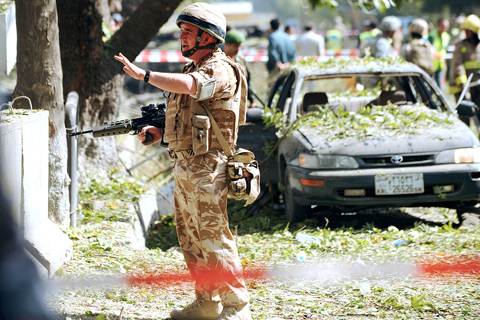A suicide car bomb exploded outside the NATO military headquarters in the Afghan capital yesterday and killed three people, the defense ministry said, in a brazen attack days before elections.
The Taliban militia behind a soaring insurgency claimed responsibility for the blast at the main gate of the heavily fortified headquarters of the International Security Assistance Force (ISAF).
The victims were confirmed to be Afghans. It was the first such attack outside the Kabul base, which collects soldiers from several countries and is the headquarters of the US commander of more than 100,000 international troops in Afghanistan to fight extremism.

PHOTO: AFP
The blast was also close to one of the security gates to the US embassy.
Dozens were wounded outside the base, police said, but ISAF could not be reached to confirm if it had any casualties.
The blast destroyed concrete security barriers and brought down branches, with huge plumes of black smoke coming from a burning vehicle that appeared to have been the car bomb.
“It was a suicide bombing carried out in a car right in front of ISAF,” defense ministry spokesman General Mohammad Zahir Azimi said, speaking from the military hospital.
“So far we have three dead, and 14 wounded, and we have evacuated them to the military hospital,” he said.
A statement from his office also gave a toll of three dead, but said 70 were wounded.
The police, however, could initially only confirm that one person had died.
“We know at this point that one person has been killed and 64 others have been wounded,” police criminal department investigation chief Sayyed Abdul Ghafor Sayedzada told reporters.
“Some of the wounded are in a bad condition. The bulk of them are civilians,” he said.
Most wounds were caused by shattered glass, a witness said.
Three or four ambulances could be seen leaving the heavily fortified base soon after the massive explosion, where the force of the blast had destroyed a large concrete barrier.
Italian troops were securing the site, he said.
Close to the site is the embassy of the US, with those of Spain and Italy also nearby.
The presidential palace is around 200m away and the residence of the Indian ambassador is also close.
A driver at the transport ministry along the same road said the heat from the burning car used to deliver the bomb had melted the tires of his vehicle.
“I had two female and one male colleague who were wounded and I was taking them to the hospital,” said the driver Abdul Raqib.
“As I passed by the explosion site it was still in flames, my tires melted. It was a car that was burning in flames,” he said.
A spokesman for the Taliban, Zabihullah Mujahed, said the attack was carried out by a member of the militia.
The man had “detonated some 500kg of explosives packed into a Surf vehicle [SUV] outside the US embassy,” he said.

EUROPEAN TARGETS: The planned Munich center would support TSMC’s European customers to design high-performance, energy-efficient chips, an executive said Taiwan Semiconductor Manufacturing Co (TSMC, 台積電), the world’s largest contract chipmaker, yesterday said that it plans to launch a new research-and-development (R&D) center in Munich, Germany, next quarter to assist customers with chip design. TSMC Europe president Paul de Bot made the announcement during a technology symposium in Amsterdam on Tuesday, the chipmaker said. The new Munich center would be the firm’s first chip designing center in Europe, it said. The chipmaker has set up a major R&D center at its base of operations in Hsinchu and plans to create a new one in the US to provide services for major US customers,

The Ministry of Transportation and Communications yesterday said that it would redesign the written portion of the driver’s license exam to make it more rigorous. “We hope that the exam can assess drivers’ understanding of traffic rules, particularly those who take the driver’s license test for the first time. In the past, drivers only needed to cram a book of test questions to pass the written exam,” Minister of Transportation and Communications Chen Shih-kai (陳世凱) told a news conference at the Taoyuan Motor Vehicle Office. “In the future, they would not be able to pass the test unless they study traffic regulations

GAINING STEAM: The scheme initially failed to gather much attention, with only 188 cards issued in its first year, but gained popularity amid the COVID-19 pandemic Applications for the Employment Gold Card have increased in the past few years, with the card having been issued to a total of 13,191 people from 101 countries since its introduction in 2018, the National Development Council (NDC) said yesterday. Those who have received the card have included celebrities, such as former NBA star Dwight Howard and Australian-South Korean cheerleader Dahye Lee, the NDC said. The four-in-one Employment Gold Card combines a work permit, resident visa, Alien Resident Certificate (ARC) and re-entry permit. It was first introduced in February 2018 through the Act Governing Recruitment and Employment of Foreign Professionals (外國專業人才延攬及雇用法),

‘A SURVIVAL QUESTION’: US officials have been urging the opposition KMT and TPP not to block defense spending, especially the special defense budget, an official said The US plans to ramp up weapons sales to Taiwan to a level exceeding US President Donald Trump’s first term as part of an effort to deter China as it intensifies military pressure on the nation, two US officials said on condition of anonymity. If US arms sales do accelerate, it could ease worries about the extent of Trump’s commitment to Taiwan. It would also add new friction to the tense US-China relationship. The officials said they expect US approvals for weapons sales to Taiwan over the next four years to surpass those in Trump’s first term, with one of them saying